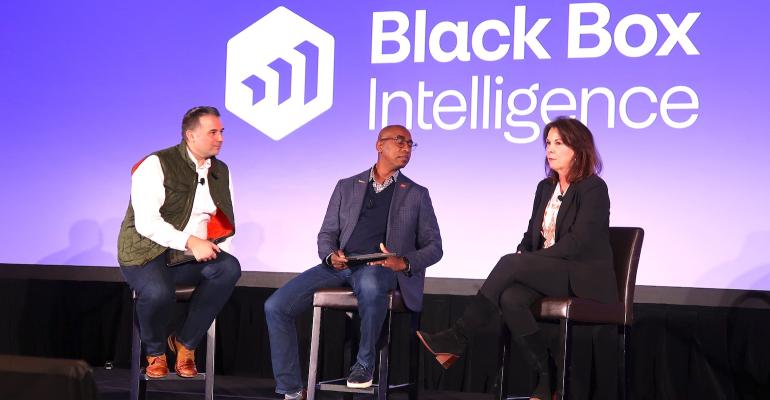“Reverse internship” initiatives, strong brand cultures and easy-to-communicate bonus programs help companies like Darden Restaurants Inc., Whataburger and Yum Brands Inc. create best-in-class employee programs, executives told the Black Box Intelligence Best Practices conference.
In the “Best Practices to Enrich the Employee Journey” panel at the Irving, Texas-based conference this week, Jamie Griffin, founder and principal at Consult to Grow, led a discussion with award finalists, including: Sarah King, chief people and diversity officer at Orlando, Fla.-based Darden; Peggy Rubenzer, chief people officer at San Antonio, Texas-based Whataburger; and James Fripp, chief diversity and inclusion officer at Louisville, Ky.-based Yum Brands Inc.
King of Darden, which owns the Olive Garden, LongHorn Steakhouse and Cheddar’s Scratch Kitchen casual-dining brands, told attendees via Zoom that: “From an organizational perspective, it really comes down to leadership. Leadership starts at the top and flows through the organization, and I think that we do a really good job of making sure that we understand our culture, understand our values. … We also have unique values in each of the brands and make sure that we hire, train, reward and retain leaders who live those values every day.”
Those ingrained values were important for the Darden brands during the disruption of the COVID-19 pandemic, she said.
“So many of the decisions that we made as an organization,” King said, “we went back to our values. That was a difficult time for everybody, and we didn't know what the playbook was.”
King said Darden’s human resources approach “just automatically creates an environment where you put people first” and allows the company’s brands to react nimbly.
“We have an incredible consumer insights team that supports each of our brands,” she added. “That helps you think about the brand and the consumer. They work closely with our marketing teams, who are world-class, and partner with the operations teams. It's just such a collaborative environment, and I think because of that we create opportunities for people to be innovative but within the framework of our Darden competitive advantages and making sure that we don't stray from what we know.”
King, as chair-elect of the Women’s Foodservice Forum, said the foodservice industry is very diverse at the entry level but less so at the top executive echelons, a disparity deepened by the pandemic. She said her mission is to address some that gender gap.
Rubenzer, chief people officer of Whataburger for nearly a year, said the 72-year-old company under private-equity ownership is focusing on growth, which poses challenging human resources hurdles.
Whataburger, she added, is looking internally to “branding” the employee experience, seeking to extend the “family member” experience from hire to retire.
The Whataburger people team is focusing on the “welcoming” part of the onboarding process, Rubenzer said, noting that Black Box Intelligence has found that “88% of the people” who remain with the company 30 days or more will stay another month.
“I think that's all about how you welcome and bring somebody on board,” Rubenzer said. “And then from there, how you get them good at something. Before you expect them to be good at too many things, get them good at something. Let them feel like they've accomplished [something] and then move them into the next roles and opportunities so those are the things that we're looking at in terms of HR and training.”
She also said bonus programs, which have been an effective tool in retention, must be easily communicated.
“I'm a believer that if you can't go home and explain to your spouse roommate or child of how your bonus works,” she explained, “you probably aren't impacting the business very much.” Whataburger is working to link bonuses to metrics that drive sales, such as earnings and online ordering, she said.
Fripp, Yum’s chief diversity and inclusion officer, said the parent to KFC, Pizza Hut, Taco Bell and Habit Burger Grill had successfully launched what it called “reverse internships” to help increase diversity in the organization.
Fripp gave the example of a reverse internship between Yum’s white chief financial officer and a “reverse mentor” of a Black employee from the Pizza Hut call center that has been effective in creating “authentic relationships led by trust,” or ART.
“It's a six-month reverse mentorship,” Fripp said. “We're now a year and five months in, and I can't get them apart.”
The younger employee, Fripp added, “because of his authentic relationship that led to trust and sponsorship, he is now doing talent acquisition on the equity-inclusion side of the business with the sponsorship” of the CFO.
Fripp, who also serves as chair-elect of the National Restaurant Association Educational Foundation, added that the industry needs to tap into the wide-ranging number of food and chef television programs.
“We’ve got show after show after show after show about cooking and baking,” Fripp noted. “Our industry is being made sexy.”
The challenge, he added, is to create marketing and connections to that popularity “in places and spaces where the folks [are] that we want to see the industry as relevant.”
Contact Ron Ruggless at [email protected]
Follow him on Twitter: @RonRuggless





